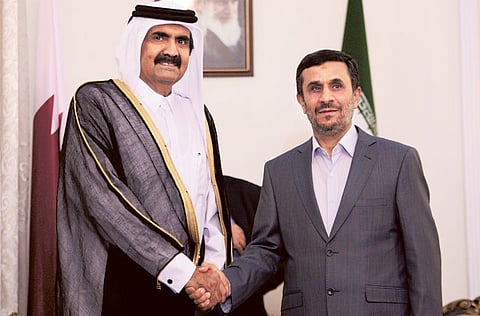Qatar in Gulf unionist camp
Doha seeks strength in both GCC alliance as well as privileged ties with West

Doha: Like several of its alliance partners within the Gulf Cooperation Council (GCC), Qatar, which hosted a large US Air Force base at Al Udayd, near Doha, wished to handle its bilateral security ties with the US with utmost care, as it was sufficiently aware that Iran remained a foe.
That is why Shaikh Hamad Bin Khalifa Al Thani welcomed King Abdullah Bin Abdul Aziz’s resolve to defend the Arabian Peninsula and gradually transform the GCC into a confederal union.
Though GCC states were unable to agree on the best ways to respond to the perceived Iranian regional threat, Doha was determined to add its voice to the ‘unionist’ camp, seeking protection in the Saudi strategic depth.
Like Kuwait, Saudi Arabia and the UAE, which displayed significant allergies to the preponderance of Iranian regional bravura, Qatar sought strength in both the GCC alliance as well as privileged ties with western powers like the US, Britain and France.
Still, Doha wished to frankly address socio-economic reservations, fearing a more or less permanent loss of its cherished political independence. It must be emphasised that while the six monarchies shared many attributes, including oil wealth, low populations, limited military capabilities, similar socio-economic set-ups and common religion, language, and culture, various obstacles faced them in unison.
Qatari officials were nevertheless sufficiently preoccupied with both Iran and Iraq, and wished to keep the two hegemonic powers at safe distances. In the aftermath of the Iraq War and the current doldrums that affected Baghdad for at least a generation, Doha focused on Iran, and called on Tehran to fully implement United Nations Security Council resolutions and International Atomic Energy Agency (IAEA) requirements, while recognising its neighbour’s right to develop peaceful nuclear facilities within the oversight and safeguards of the Vienna-based IAEA.
Moreover, Doha rejected putative Iranian interferences in its internal affairs, as well in the domestic political life of its partners, especially in Bahrain and Kuwait, and indirectly through Hezbollah, in Saudi Arabia and the UAE. This was not a light decision since Qatar shared close economic ties with Iran that required utmost attention.
In fact, the two countries shared the Pars/North Dome field, an under water gas reservoir that, according to the International Energy Agency held an estimated 51 trillion cubic metres of natural gas as well as some 50 billion barrels of natural gas concentrates.
Regrettably, joint exploitation was not as felicitous as many contemplated, with the Iranian Oil Minister Rostam Qassemi pushing contractors drilling on the Iranian side to “work around the clock” to catch up with the Qataris.
Periodically, agitated Iranian officials speak of Qatari pilfering in the Gulf, with the Iranian parliamentarian Ahmad Mahdavi, for example, informing his colleagues that Doha was taking three times as much gas out of the shared field than Iran.
Although no Iranian leader used this alleged imbalance as a pretext for military confrontation, the issue was super-sensitive, with Qatar aware that its neighbour could resort to it as it attempts to shape Qatari calculations about its regional goals.
Equally important were the unprecedented uncertainties in Qatari-Iranian ties, despite Shaikh Hamad’s frequent endeavours to persuade President Mahmoud Ahmadinejad to adopt more moderate steps.
It was worth recalling that the Qatari ruler invited his Iranian counterpart to attend the 2007 GCC Doha Summit — which alliance partners reluctantly accepted — precisely to improve stressed ties.
No progress was achieved since that controversial participation, as the Iranian president cancelled a planned trip to Doha in November 2011, in part to express frustration of Doha’s alleged roles in Libya and Syria.
During the past year, anti-Qatari Iranian rhetoric reached new heights, especially as Tehran believed that Doha was embarked on a dangerous game by spearheading Arab efforts to remove the Iranian-backed regime of Bashar Al Assad in Syria.
Nevertheless, and although Iran strongly resented what it labelled as Qatar’s “adventurism in Syria”, Tehran’s long-term choices vis-à-vis Doha were extremely limited.
Indeed, Iran’s own adventurism in the Gulf region essentially enlarged the gulf separating it from GCC rulers, which was not in its own best interests. On the contrary, Tehran needed to maintain whatever entente it still had among Arab Gulf leaders, at a time when Arab-Iranian tensions run high. How Iran responded to Qatar was thus relevant to Doha’s perceptions of the GCC union proposal.
It was within such a framework that Qatar favoured a GCC alliance rapprochement, while it contemplated the best method to dissuade Saudi Arabia from reasserting itself over it, even if it favoured the establishment of a strong multilateral intervention force.
Doha accepted the notion that the primary goal of the GCC was to unify military cooperation, multilaterally through the Dara Al Jazira (Peninsula Shield) Force, and bilaterally between individual countries and leading Western powers.
Towards that end, it extended generous financial assistance to both Oman and Bahrain to purchase sorely needed equipment, as well as beefing up its own meager resources.
Still, and despite significant military expenditures, Qatar fielded a weak military when measured vis-à-vis its needs, which was why Doha essentially accepted to embark on the union bandwagon.
This is the fourth in the series of articles discussing union from each GCC member-state’s perspective to be published every Sunday.
Sign up for the Daily Briefing
Get the latest news and updates straight to your inbox


